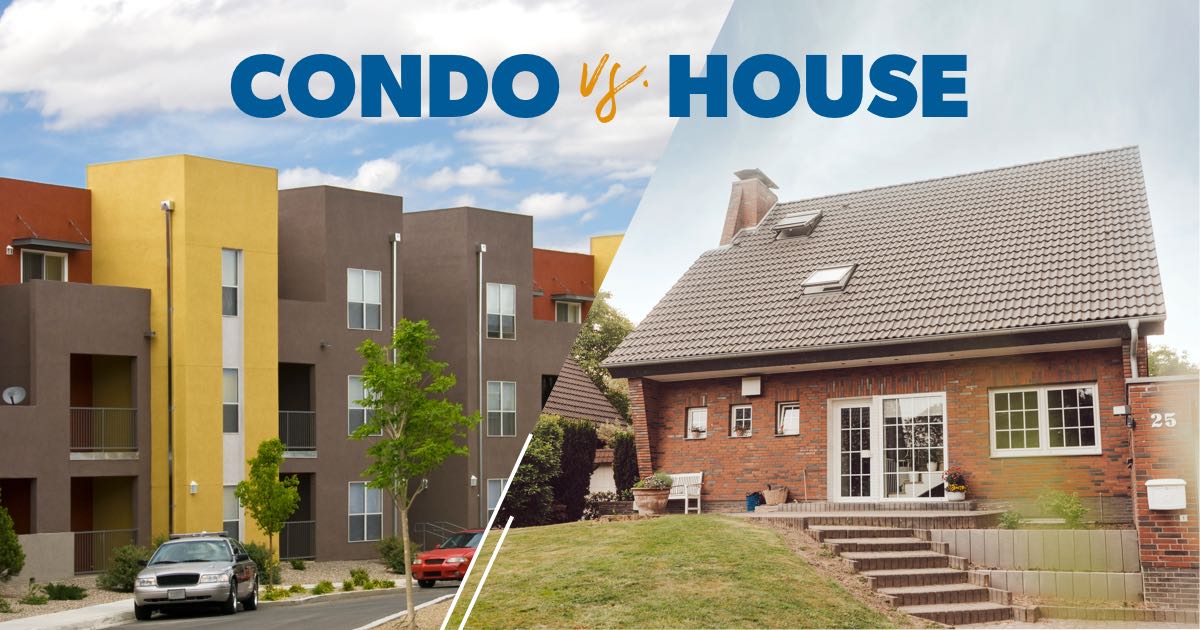
So, you’re finally ready to buy your first home. You look at listings and you see lots of different types of properties—all with different features, floorplans and square footage. Some have lots of space between your neighbors, while others are literally right next to each other.
And then comes the different types of houses. Should you buy a condo or should you buy a house? What exactly is the difference between them? There are advantages and disadvantages to both a house and a condo. But which one is better? And how do you decide?
It’s condo versus house. This might sound like an MMA fight, but it’s really just a matter of preference. Let’s take a look at both types of housing and find out which might be better fit for you!
What Is a House?
You may be asking yourself, What kind of dumb question is that? But for our purposes here, it’s good to define our terms. A house is a free-standing residence with four outer walls that are not connected to any other residential structure. It’s usually on a lot with a yard in the front and/or back, and the owner of the house also owns the land the house sits on and any other structures like a detached garage or in-law unit.
Find expert agents to help you buy your home.
Although you’ll find row houses that are built side by side on small lots (often in densely populated cities), a more typical example is the suburban home on a big lot with a couple of trees and a large lawn to mow. Townhouses are another common style you’ll see, and they sit somewhere between condo living and traditional single-family homes.
What Is a Condo?
A condo (short for condominium) is more like an apartment you own. It’s in a shared building or a complex, and it’s usually much smaller in square footage than a house.
A condo board or homeowners association (HOA) owns and maintains the exterior of the building and all the common areas like parking garages, swimming pools, the clubhouse, and maybe a gym. Different condo complexes have different features depending on their size and location.
Condos are very popular with first-time homebuyers, downsizers and investors. They’re typically less expensive than houses, but you do have to pay attention to those pesky HOA fees.
What Are the Costs of a Condo or a House?
Okay, folks. It’s time to talk about money.
We know the cost of any piece of real estate is not limited to the listing price. You’ve also got homeowner’s insurance, property taxes, mortgage insurance (if your down payment is less than 20%), and possibly HOA fees.
Bottom line: Just make sure you understand all the costs associated with a condo or a house before buying either one.
Condo Costs
A condo is usually less expensive than a free-standing house. Condos are much smaller in square footage, and maintenance is typically cheaper because you’re only responsible for the interior of your home. You don’t have to worry about landscaping, the roof or the exterior walls. The condo board or HOA covers those.
Oh, yeah. . . condos typically charge HOA fees. This is one area where the costs of a condo can really shoot up. Keep in mind that the fewer amenities the condo complex has, the lower the HOA fees should be. Doormen, swimming pools, dog parks, gyms, parking garages, storage units and security all cost money. So, if you don’t care about a pool or a gym, let your real estate agent know when you’re shopping around.
And because you’re only responsible for the interior, homeowner’s insurance will cost less than it does for a single-family house. The HOA often covers the insurance on the exterior. If the roof comes off, the HOA’s insurance (which is paid for by your HOA fees) should cover the cost of repairs. But if you try to fry a turkey that’s still frozen and it explodes and engulfs your kitchen in flames, you’d better hope you have good homeowner’s insurance.
House Costs
A detached, single-family home is typically going to be more expensive than a condo for a number of reasons. First of all, as we mentioned, they’re bigger than condos. And when you own a house, you own the whole thing, inside and out.
Insurance is also more expensive for a house because you’re insuring the whole house and the property it sits on. You’ll be responsible for things like landscaping and maintaining gutters and the roof. Do you like mowing the lawn? Great! If not, you may have to pay someone to do it, and you’ll need to factor that into your monthly expenses.
Cities and counties don’t normally tax condos and houses differently. Property is property, and they assess it that way. But if you own a house, you probably own a lot more property, so expect your property taxes to be higher.
Want More Expert Real Estate Advice?
Sign up for our newsletter! It’s packed with practical tips to help you tackle the housing market and buy or sell your home with confidence—delivered straight to your inbox twice a month!
What Are the Pros and Cons of Living in a Condo or a House?
Unlike comparing condos and townhomes, which is very much an apples-to-apples comparison, the differences between condo living and house living are much more significant. Condos are smaller and part of a community. Houses are in neighborhoods, and many new houses are built as part of planned developments that may also come with HOAs. But your four walls and your yard are your own.
Here are some big things to consider:
1. Condo living is community living.
You’re naturally going to be a lot closer to your neighbors when you share walls. You’ll also have more opportunities to interact with your neighbors in the communal mail room, shared parking lot, club house, and swimming pool area and at periodic meetings of the HOA or condo board.
This can be a blessing if the community is well-managed and you like your neighbors. But if you tend to be a hermit or your condo is full of “Nosy Rosies” who are all up in your business every time you step out of your door, condo living can be a curse.
Pro: There are lots of chances to make friends.
Con: You may not want to be friends with these people.
2. You’ll have a lot more privacy in a house.
Depending on the neighborhood, the size of your lot and, of course, the size of your house, you can have a lot of privacy in a single-family home. But this increased privacy could come at an increased cost as you pay for the luxury of owning those four walls.
Then again, some people are social and there could be such a thing as too much privacy. Good neighbors can be a blessing. For example, if you’re leaving town and need someone to keep an eye on your place, you’ll have more peace of mind knowing your neighbors are watching. You just have to balance what’s important to you.
Pro: Plenty of privacy and say-so over how you use the property.
Con: You have to handle a lot of stand-alone issues yourself.
3. Your HOA’s rule is the law of the land in a condo.
Condo HOAs can have lots of rules—even about the color your curtains can be. You’ll want to read the condo covenant and get intimately familiar with the rules and regulations to see if you can get on board with them. If they seem too nitpicky to you, keep looking for a place with more reasonable expectations.
A good HOA will make your life easier and help increase the value of your investment. A poorly run HOA can do the opposite. So do your research before buying a condo.
Another issue to look into: Make sure the units are mostly occupied by owners. If there are too many renters, it means you’ll be trying to own a home in a sea of temporary occupants who don’t have any real skin in the game when it comes to taking care of the common areas.
Now, you may run into an HOA if you buy a house in a planned community. They are typically less authoritarian (although there may be rules about what type of fencing or style of mailbox you can have in front of your house), and they mainly exist to maintain things like community playgrounds and pools. Ask your real estate agent about this detail before you buy. The HOA fees for a housing development are usually a lot lower than condo HOAs, except in very high-end neighborhoods.
Pro: A good HOA is a pleasure to work with and makes condo ownership a breeze.
Con: A bad HOA will make you wish you’d bought somewhere else.
Are You Ready to Buy a Condo or a House?
Whether you’ll feel more at home in a condo or a house, the first thing you should ask yourself is if you’re truly ready to buy. See, a home, no matter what type, should be a blessing—an asset to help you and your family build real wealth. But if you buy a home before you’re financially ready, it could turn into a curse. And if you’re a first-time buyer, you’ll definitely want to avoid the most common mistakes young homeowners make.
Wait to buy a home until you’re out of debt, have a fully funded emergency fund of 3–6 months of expenses, and have a 20% down payment saved up (5–10% is okay, but not ideal because your lender will require you to pay for private mortgage insurance). Then, when you’re ready to buy, stick to the 25% rule: Your monthly mortgage payment should be no more than 25% of your monthly take-home pay.
You can use our Mortgage Calculator to find out how much house you can actually afford.
Get an Agent in Your Corner
If you’re ready to buy a home of your own—condo or a house—don’t go it alone! Talk to a real estate agent who’s an expert in your local market, is focused on your individual needs, and will be dedicated to finding you the perfect home at the perfect price.
Our RamseyTrusted agents are superstars at serving their clients the Ramsey way. They will help you make the best decision for your situation. They’re the only agents we trust to see you through from start to finish.
Find an agent in your area today!
Next Steps
- Decide which type of home (condo or house) has more pros than cons for you.
- Find out how much house you can afford with our Mortgage Calculator.
- Get our free guide on how to save for a down payment.
- Talk to one of our RamseyTrusted real estate agents to get the process started.
Did you find this article helpful? Share it!

We Hear You!
We’re considering adding the ability to save articles to your Ramsey account.




